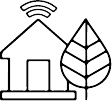Our areas of expertise
Focus areas
-
 Smart Energy
Smart Energy
Renewable energy is the future. Cities and communities must increase their focus on green energy and ensure more renewable energy is integrated into energy systems to contribute to reductions in greenhouse gas emissions.
Smart Energy is about leveraging new technology to optimize energy production, distribution, and storage, connected to energy consumers. The energy sector is facing significant future changes and must harness digital data for new insights and business models related to energy trading.
-
 Smart Mobility
Smart Mobility
Mobility is crucial for cities and communities to function well. A central goal in the transport sector is that all growth in personal transportation in larger Norwegian urban areas should occur through public transport, cycling, and walking. Efficient, safe, accessible, and environmentally friendly mobility systems should make it more attractive to use bicycles or public transportation instead of private cars for all types of journeys.
To succeed in creating sustainable urban spaces, land use and transportation planning must be coordinated. The transportation sector is facing extensive technological and digital transformation. With urban densification, digital data, digital transformation, and increasing demands for environmentally friendly mobility systems, we will move in entirely different ways in the future than today. Trends indicate that shared mobility, autonomous vehicles, and "connected mobility services" are the most significant areas of development.
-
 Smart Health
Smart Health
An increasing urban population and a growing proportion of elderly in the population pose economic and staffing challenges for the health and welfare sector leading up to 2040. Cities and communities must utilize and further develop the opportunities provided by welfare technology platforms in collaboration with citizens, healthcare services, other public sectors, academia, and businesses to create sustainable solutions in the healthcare sector.
Smart cities emerge where knowledge and expertise are updated and nurtured. In smart societies, good ideas must be captured and further developed. Cities and communities must utilize their creativity, education, and competence to create concrete sustainable innovations for the benefit of all citizens, the climate, and the environment. Emphasizing the use of internal expertise and collaboration with local, regional, and international research and competence centers is crucial for succeeding in smart city initiatives.
-
 Smart Water
Smart Water
Production and consumption of water require significant resources and costs for cities and communities. Between 15-70 percent of produced water annually leaks from Norwegian municipal water supply systems.
Increased awareness regarding water consumption, along with the utilization of new technology for water systems, will lead to reduced operating costs for cities and communities and decreased use of resources and greenhouse gas emissions.
-
 Smart Building
Smart Building
-
 Smart Interaction
Smart Interaction
Cities and communities must collaborate with citizens and businesses to create favorable conditions for development, growth, and the good life.
Smart Interaction is also about developing new platforms for communication and idea development. The use of digital solutions and social networks provides space for increased co-creation and involvement.
